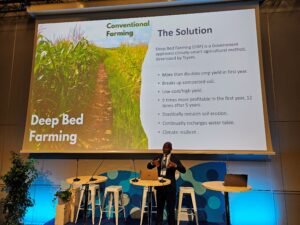SIWI, AGWA set criteria for water climate bond standard
The world’s first certified green bond has been issued under a Standard whose criteria was co-developed by SIWI and the Alliance for Global Water Adaptation (AGWA) - a network hosted and chaired by SIWI.
The world’s first certified green bond under the Water Climate Bonds Standard has been issued by the San Francisco Public Utilities Commission (SFPUC). The criteria for the Standard was developed by two working groups led by John Matthews from the Alliance for Global Water Adaptation (AGWA) – a network hosted and chaired by SIWI. Nearly half of the working groups consisted of AGWA members.
The Water Climate Bonds Standard is a screening tool for investors that specifies the criteria that must be met for bonds to be labelled as ‘green’ or earmarked for funding water-related, resilient, and low carbon initiatives. These criteria represent the first phase of a two-phase process.
The first phase of work concentrated on the clear articulation of resilience and greenhouse gas impacts of water investments, embedded in a matrix of economic and ecological systems. The standard reflects an abrupt shift in how many issuers and investors have seen climate change – less a distant, abstract issue, to something that influences their investment and sustainability strategy.
John Matthews from AGWA scored the first bond (the SFPUC issuance) which was then certified by a Toronto group, Sustainalytics, as meeting the standard criteria.
SIWI’s Executive Director, Torgny Holmgren was one of the most active expert reviewers in this process, and was spokesperson for the group in several venues, including (but not limited to) COP21 in Paris. He also represented the Water Climate Bond Standard in various policy circles.
“I very much welcome this first issue under the Water Standards and believe it is not only good for the issuer proper but also a necessary first step to show how to handle more scarce water resources in the future,” Mr Holmgren said.
SIWI and AGWA have taken a leadership role in the second phase of the work, which is already underway. Expected to be completed by January 2017, this phase focuses on ecosystem-based adaptation and mitigation for freshwater investments.
“As we now transition to the second phase, I believe we may be doing more than moving ahead of the curve and actually starting to bend the curve of sustainability and investment itself. Green, nature-based solutions have resided mostly in the realm of advocacy and “pretty” pilot studies. Evaluating and financing these approaches as investments that can compete against traditional grey solutions in terms of efficacy and profit marks a profound change,” said John Matthews.
Additional information:
Proceeds from the SFPUC’s $240m Wastewater Revenue Bond will fund eligible projects in sustainable stormwater management and wastewater projects included in the SFPUC Sewer System Improvement Program (SSIP) Phase 1.
International research and analysis firm Sustainalytics has provided third-party verification that the SFPUC bond conforms to the Climate Bonds Standard. The Water Climate Bonds Criteria were created with an international consortium of partners CBI, Ceres, WRI, AGWA (with SIWI), and CDP.
The criteria will also help corporate, municipal and other bond issuers expand their green bond offerings into water-related projects. These criteria can be used to evaluate projects as diverse as energy or industrial water efficiency, reuse, catchment or watershed restoration and or large-scale water supply infrastructure development.








